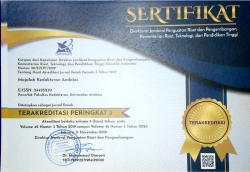Omega-3 for Inflammatory Bowel Disease: Is it worthy?- A Literature Review
Abstract
Tujuan: Memberikan pemahaman mengenai potensi terapeutik asam lemak omega-3 dalam penanganan Inflammatory Bowel Disease (IBD). Metode: Artikel ini disusun berdasarkan metode tinjauan literatur. Sumber data diperoleh dari artikel-artikel ilmiah yang dipublikasikan di jurnal internasional berbahasa Inggris. Proses pencarian literatur dilakukan melalui mesin pencari Google Scholar dan PubMed. Hasil: Inflammatory Bowel Disease (IBD), yang mencakup kondisi seperti Ulcerative Colitis (UC) dan Crohn's Disease (CD), merupakan kelompok gangguan inflamasi kronis yang mempengaruhi saluran pencernaan. Dalam beberapa tahun terakhir, asam lemak omega-3 telah menjadi titik perhatian dalam diskusi IBD, terutama karena sifat anti-inflamasinya. Penelitian epidemiologi menunjukkan bahwa diet kaya omega-3 dapat meningkatkan kemungkinan remisi klinis pada pasien IBD. Sebagai contoh, pasien UC yang mengonsumsi salmon Alaskan dalam jumlah tinggi menunjukkan penurunan marker inflamasi dibandingkan dengan kelompok kontrol. Kesimpulan: Bukti saat ini menunjukkan bahwa makanan alami yang kaya omega-3, seperti salmon, memiliki potensi manfaat dalam penanganan Inflammatory Bowel Disease.
Keywords
Full Text:
PDFReferences
Huang X, Li Y, Zhuang P, et al. Habitual Fish Oil Supplementation and Risk of Incident Inflammatory Bowel Diseases: A Prospective Population-Based Study. Front Nutr. 2022;9(July):1-10. doi:10.3389/fnut.2022.905162
Persatuan Gastoenterologi Indonesia (PGI). Konsensus Nasional Penatalaksanaan IBD Di Indonesia (Revisi 2019). PIP Interna; 2019.
Marton LT, Goulart R de A, Carvalho ACA de, Barbalho SM. Omega fatty acids and inflammatory bowel diseases: An overview. Int J Mol Sci. 2019;20(19). doi:10.3390/ijms20194851
Shafiee NH, Manaf ZA, Mokhtar NM, Ali RAR. Anti-inflammatory diet and inflammatory bowel disease: what clinicians and patients should know? Intest Res. 2021;19(2):171-185. doi:10.5217/ir.2020.00035
Mozaffari H, Daneshzad E, Larijani B, Bellissimo N, Azadbakht L. Dietary intake of fish, n-3 polyunsaturated fatty acids, and risk of inflammatory bowel disease: a systematic review and meta-analysis of observational studies. Eur J Nutr. 2020;59(1):0. doi:10.1007/s00394-019-01901-0
Gutierrez-Hervas A, Garciá-Sanjuán S, Gil-Varela S, Sanjuán-Quiles Á. Relationship between dietary omega-3/omega-6 fatty acids and inflammatory bowel disease: Scoping Review. Rev Esp Nutr Humana y Diet. 2019;23(2):92-103. doi:10.14306/renhyd.23.2.720
Astore C, Nagpal S, Gibson G. Mendelian Randomization Indicates a Causal Role for Omega-3 Fatty Acids in Inflammatory Bowel Disease. Int J Mol Sci. 2022;23(22). doi:10.3390/ijms232214380
Cluxton D, Petrasca A, Moran B, Fletcher JM. Differential regulation of human treg and Th17 cells by fatty acid synthesis and glycolysis. Front Immunol. 2019;10(FEB):1-12. doi:10.3389/fimmu.2019.00115
Luu M, Pautz S, Kohl V, et al. The short-chain fatty acid pentanoate suppresses autoimmunity by modulating the metabolic-epigenetic crosstalk in lymphocytes. Nat Commun. 2019;10(1):1-12. doi:10.1038/s41467-019-08711-2
Hahn J, Cook NR, Alexander EK, et al. Vitamin D and marine omega 3 fatty acid supplementation and incident autoimmune disease: VITAL randomized controlled trial. BMJ. 2022;376. doi:10.1136/bmj-2021-066452
de Bus I, Witkamp R, Zuilhof H, Albada B, Balvers M. The role of n-3 PUFA-derived fatty acid derivatives and their oxygenated metabolites in the modulation of inflammation. Prostaglandins Other Lipid Mediat. 2019;144(June):106351. doi:10.1016/j.prostaglandins.2019.106351
Chappus-McCendie H, Chevalier L, Roberge C, Plourde M. Omega-3 PUFA metabolism and brain modifications during aging. Prog Neuro-Psychopharmacology Biol Psychiatry. 2019;94(May):109662. doi:10.1016/j.pnpbp.2019.109662
Manson JE, Cook NR, Lee IM, et al. Marine n−3 Fatty Acids and Prevention of Cardiovascular Disease and Cancer. N Engl J Med. 2019;380(1):23-32. doi:10.1056/nejmoa1811403
Horigome A, Okubo R, Hamazaki K, et al. Association between blood omega-3 polyunsaturated fatty acids and the gut microbiota among breast cancer survivors. Benef Microbes. 2019;10(7):751-758. doi:10.3920/BM2019.0034
Fu Y, Wang Y, Gao H, et al. Associations among Dietary Omega-3 Polyunsaturated Fatty Acids, the Gut Microbiota, and Intestinal Immunity. Mediators Inflamm. 2021;2021. doi:10.1155/2021/8879227
Sundaram TS, Giromini C, Rebucci R, Pistl J, Bhide M, Baldi A. Role-of-omega3-polyunsaturated-fatty-acids-citrus-pectin-and-milkderived-exosomes-on-intestinal-barrier-integrity-and-immunity-in-animalsJournal-of-Animal-Science-and-Biotechnology.pdf. 2022;7:1-22.
Sugihara K, Morhardt TL, Kamada N. The role of dietary nutrients in inflammatory bowel disease. Front Immunol. 2019;10(JAN):1-16. doi:10.3389/fimmu.2018.03183
Morshedzadeh N, Rahimlou M, Shahrokh S, Mirmiran P, Zali MR. Nutritional management of inflammatory bowel disease; an overview of the evidences. Diabetes Metab Syndr Clin Res Rev. 2022;16(3):102440. doi:10.1016/j.dsx.2022.102440
Charpentier C, Chan R, Salameh E, et al. Dietary n-3 PUFA may attenuate experimental colitis. Mediators Inflamm. 2018;2018. doi:10.1155/2018/8430614
Forbes A, Escher J, Hébuterne X, et al. ESPEN guideline: Clinical nutrition in inflammatory bowel disease. Clin Nutr. 2017;36(2):321-347. doi:10.1016/j.clnu.2016.12.027
Parolini C. Effects of fish n-3 PUFAs on intestinal microbiota and immune system. Mar Drugs. 2019;17(6). doi:10.3390/md17060374
Damas OM, Garces L, Abreu MT. Diet as Adjunctive Treatment for Inflammatory Bowel Disease: Review and Update of the Latest Literature. Curr Treat Options Gastroenterol. 2019;17(2):313-325. doi:10.1007/s11938-019-00231-8
Lewis JD, Abreu MT. Diet as a Trigger or Therapy for Inflammatory Bowel Diseases. Gastroenterology. 2017;152(2):398-414.e6. doi:10.1053/j.gastro.2016.10.019
Scaioli E, Cardamone C, Liverani E, Munarini A, Hull MA, Belluzzi A. The pharmacokinetic profile of a new gastroresistant capsule preparation of eicosapentaenoic acid as the free fatty acid. Biomed Res Int. 2015;2015. doi:10.1155/2015/360825
Yasueda A, Shinzaki S, Iijima H, et al. Safety of emulsifying lipid formulation containing omega-3 polyunsaturated fatty acids for patients with Crohn’s disease. Anticancer Res. 2016;36(7):3753-3759.
Prossomariti A, Scaioli E, Piazzi G, et al. Short-term treatment with eicosapentaenoic acid improves inflammation and affects colonic differentiation markers and microbiota in patients with ulcerative colitis. Sci Rep. 2017;7(1):1-10. doi:10.1038/s41598-017-07992-1
Scaioli E, Sartini A, Bellanova M, et al. Eicosapentaenoic Acid Reduces Fecal Levels of Calprotectin and Prevents Relapse in Patients With Ulcerative Colitis. Clin Gastroenterol Hepatol. 2018;16(8):1268-1275.e2. doi:10.1016/j.cgh.2018.01.036





















